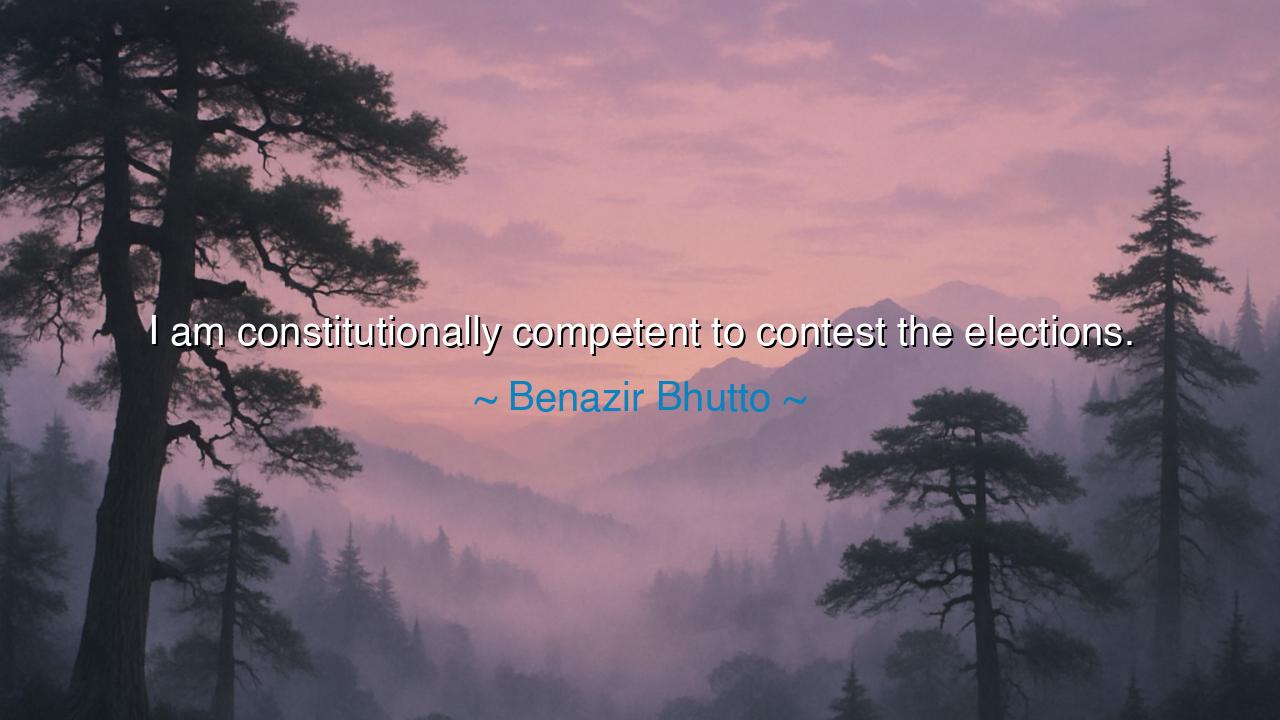
I am constitutionally competent to contest the elections.






In the storm-tossed political seas of Pakistan, when fear and power clashed like thunder in the heavens, Benazir Bhutto, daughter of a slain leader and heir to a troubled nation, stood before her people with the courage of a lioness and declared: “I am constitutionally competent to contest the elections.” Though the words appear simple, they carried the force of defiance, dignity, and destiny. For in that moment, she was not merely asserting her legal right — she was proclaiming her moral and constitutional claim to participate in the fate of her nation, to stand where tyranny sought to silence her. Her voice rose not from privilege, but from the eternal cry of every free spirit who dares to challenge oppression with the authority of law and the strength of principle.
The origin of this quote lies in the dark and uncertain days of the late 1980s and early 1990s, when Bhutto — the first woman to lead a Muslim-majority nation — faced relentless persecution, imprisonment, and exile. Her enemies, fearing her return to power, sought to bar her from contesting elections on false grounds, claiming that she was unfit, unworthy, or legally disqualified. Yet Bhutto, educated in the halls of Oxford and Harvard, knew the Constitution of Pakistan as intimately as she knew her own soul. She invoked not emotion but law, declaring that by the nation’s own charter, she had the right to stand before the people’s judgment. In uttering those words, she wielded the Constitution as both shield and sword — the instrument of justice against those who would twist it for tyranny.
But beyond the political moment, her declaration touches upon a deeper truth: that the legitimacy of leadership comes not from lineage, gender, or the approval of the powerful, but from adherence to the law and the consent of the governed. In saying “I am constitutionally competent,” Bhutto was affirming that no ruler, no military, and no man could deny what the Constitution itself had granted. It was the voice of justice speaking against arbitrary power, of civilization asserting itself over chaos. For in every nation where the rule of law is threatened, there must arise a voice that reminds the people — and their rulers — that the law is greater than any individual’s ambition.
Her words recall the struggles of those before her who defied authority not with violence, but with lawful courage. Think of Socrates, standing before his accusers, declaring his right to question and to speak truth; think of Nelson Mandela, who stood in a courtroom and declared himself innocent under the higher laws of justice, even as unjust laws condemned him. Bhutto’s defiance was born of the same spirit — that power must answer to principle, and governance must bow before the Constitution. To be “constitutionally competent” is not merely to meet the letter of the law, but to embody its spirit — to respect, uphold, and be shaped by the rule of justice itself.
Her statement also carried within it the silent anguish of women across the world who have been told they are unfit to lead. In her voice, the centuries of exclusion and silencing found their reply. Bhutto did not merely speak for herself; she spoke for every woman who had ever been told that her rightful place was anywhere but the throne of power or the seat of decision. Her words were a declaration of equality before the law, a reminder that the Constitution — if it is truly just — recognizes no gender, no caste, no privilege. It recognizes only the competence of character and the will to serve.
And yet, her courage came at great cost. The history of Pakistan bears witness to the price of principle. Twice she was elected, twice she was deposed; her family was torn apart by assassinations and exile. Yet she never surrendered her faith in democracy or her respect for the law. Even when her life was under threat, she returned to her homeland, standing by her belief that leadership is not seized by force, but earned through legitimacy and law. In her final years, her words gained prophetic weight — for though her body would fall to violence, her faith in constitutional order became her lasting legacy.
The lesson of Benazir Bhutto’s words, then, transcends time and place. She teaches that law is the truest guardian of liberty, and that the power of a people lies in their courage to defend it. Governments may rise and fall, leaders may be praised or condemned, but a nation that honors its Constitution stands unbroken. Her declaration reminds us that justice is not a gift bestowed by rulers, but a right that belongs to the governed. And to preserve that right, each generation must speak with the same fearless conviction: We are constitutionally competent. We are free by law, and none shall take that from us.
So remember the wisdom of Benazir Bhutto, martyr of democracy and daughter of courage: “I am constitutionally competent to contest the elections.” Let her words be a flame against the darkness of corruption and tyranny. For the Constitution — whether of Pakistan, or of any nation that claims to be free — is not parchment, but promise. And that promise lives only so long as there are souls brave enough to stand beneath it, to defend it, and to say: The law, not fear, shall rule this land.






AAdministratorAdministrator
Welcome, honored guests. Please leave a comment, we will respond soon